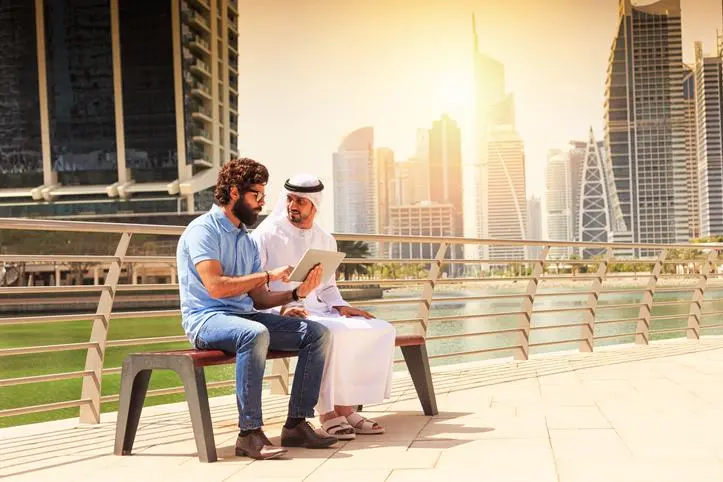PHOTO
ABU DHABI: The humanity's shortsightedness has prompted us to consider one dimension of our wealth, which caused many crises in recent history, according to a prominent sustainability thought leader.
Humans have mismanaged public wealth by measuring it incorrectly, Pavan Sukhdev said in a lecture at the Majlis of His Highness Sheikh Mohamed bin Zayed Al Nahyan, Crown Prince of Abu Dhabi and Deputy Supreme Commander of the UAE Armed Forces.The political and economic systems regard growth in a nation’s GDP and an organisation’s profit and loss as the determining factors of success, he said.The lecture titled 'Redefining Wealth for an Economy of Permanence' was held at Abu Dhabi’s Al Bateen Palace on Wednesday and was attended by Sheikh Mohamed bin Zayed and other dignitaries.
"We live in an age where humanity has begun to significantly impact the Earth's geology and ecosystems, causing irreversible damage and rapidly using up resources as if they happened to be unlimited. What is required instead is a change of economic direction and a new type of corporation whose goals are perfectly aligned with society rather than at its expense," Sukhdev said.
The economic model of the sixties was described as a rampant ‘cowboy economy’ by the economist and philosopher Kenneth Boulding, said Sukhdev, who is also Goodwill Ambassador for UNEP and TEEB and Special Adviser to its new study, TEEB for Agriculture and Food.
In his 1966 essay, The Economics of the Coming Spaceship Earth, Boulding argued in favour of a responsible and circular economy that was akin to a ‘spaceman’ economy, recognising resource limits. Twenty years before this, the Gandhian economist J.C. Kumarappa coined the term ‘economy of permanence’ to describe an economy that was cyclical, and hence permanent.
The ‘economy of permanence’ found that wealth existed in three tiers - private, community and public – and that well-being could be achieved only if all tiers attracted investment, said Sukhdev, the environmental economist.
It also recognised that wealth had many forms – natural, human, social and produced – all of which were necessary for economic progress. However, government policies and investments cannot be accurately formulated without metrics that consider all tiers of ownership and all forms of wealth. Today’s metrics – such as organisational profit-and-loss accounts – only measure changes in privately-owned produced capital, ignoring all other categories. This cannot be the way forward, he said.
The biggest financial and economic crises of recent times, such as the 1997-98 Asian debt crisis and the 2008 global financial crisis can be attributed to poorly understood risk and badly managed credit. Sooner rather than later, all countries will have to stop using the wrong criteria to pursue economic development for its citizens, said Sukhdev, who in 2011 was awarded the McCuskey Fellowship by Yale University.
At Yale, he taught a graduate course on TEEB and wrote Corporation 2020, a book and movement about transforming business for tomorrow’s world by creating private profits without causing public losses. Countries need to move in the direction of an inclusive green and circular economy and conduct business more responsibly and transparently so as to achieve sustainable development, he said.
The UAE is home to many industries and it has reduced its dependence on oil and gas, making it one of the most diversified Gulf economies, said Sukhdev, a career banker and Founder-CEO of the sustainability consulting firm GIST Advisory. The UAE’s strategic plan for the next five years is to focus on further economic diversification, trade and tourism, improving education and increasing private sector employment. This entails evaluating the most important risks and opportunities and recognising the many dimensions of wealth.
A lot of UAE’s energy is sourced from fossil fuels, which are a key area of stranded-asset risk that needs to be managed, said Sukhdev, who was appointed President of WWF-International in January 2018.
With Abu Dhabi’s ‘Economic Vision 2030’, the government has taken steps to develop the renewable energy sector. The private sector contributes the lion’s share to the UAE’s GDP and thus any transition to a different model would need to leverage the private sector’s contribution to the country.
In conclusion, Sukhdev said an economic shift needs to take place, the right system of measurement is adopted, and incentives and disincentives are aligned so as to achieve an economy of permanence. Unless this happens, ‘business-as-usual’ behavior by the private sector will continue to create huge public costs to generate private profits, leading to resources being used up rapidly. This would put livelihoods at risk and is a future that none of us can afford; therefore, economic transformation is required to deliver the economy of tomorrow, Sukhdev said.
© Copyright Emirates News Agency (WAM) 2019.





















